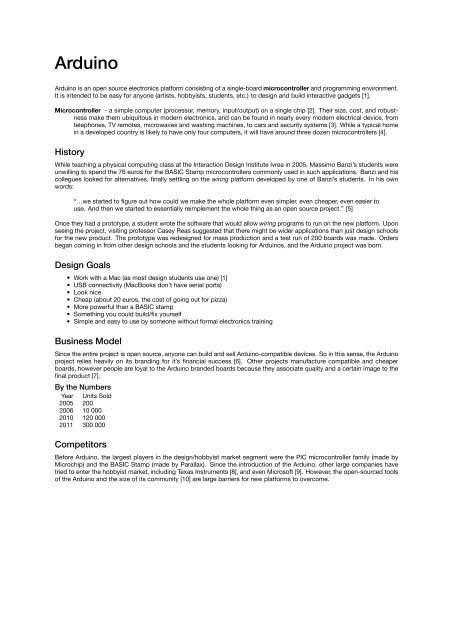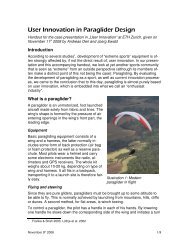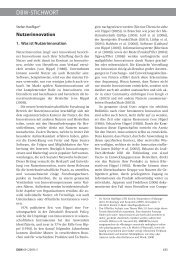Arduino - SMI
Arduino - SMI
Arduino - SMI
Create successful ePaper yourself
Turn your PDF publications into a flip-book with our unique Google optimized e-Paper software.
<strong>Arduino</strong><br />
<strong>Arduino</strong> is an open source electronics platform consisting of a single-board microcontroller and programming environment.<br />
It is intended to be easy for anyone (artists, hobbyists, students, etc.) to design and build interactive gadgets [1].<br />
Microcontroller - a simple computer (processor, memory, input/output) on a single chip [2]. Their size, cost, and robustness<br />
make them ubiquitous in modern electronics, and can be found in nearly every modern electrical device, from<br />
telephones, TV remotes, microwaves and washing machines, to cars and security systems [3]. While a typical home<br />
in a developed country is likely to have only four computers, it will have around three dozen microcontrollers [4].<br />
History<br />
While teaching a physical computing class at the Interaction Design Institute Ivrea in 2005, Massimo Banzi’s students were<br />
unwilling to spend the 76 euros for the BASIC Stamp microcontrollers commonly used in such applications. Banzi and his<br />
collegues looked for alternatives, finally settling on the wiring platform developed by one of Banzi’s students. In his own<br />
words:<br />
“…we started to figure out how could we make the whole platform even simpler, even cheaper, even easier to<br />
use. And then we started to essentially reimplement the whole thing as an open source project.” [5]<br />
Once they had a prototype, a student wrote the software that would allow wiring programs to run on the new platform. Upon<br />
seeing the project, visiting professor Casey Reas suggested that there might be wider applications than just design schools<br />
for the new product. The prototype was redesigned for mass production and a test run of 200 boards was made. Orders<br />
began coming in from other design schools and the students looking for <strong>Arduino</strong>s, and the <strong>Arduino</strong> project was born.<br />
Design Goals<br />
• Work with a Mac (as most design students use one) [1]<br />
• USB connectivity (MacBooks don’t have serial ports)<br />
• Look nice<br />
• Cheap (about 20 euros, the cost of going out for pizza)<br />
• More powerful than a BASIC stamp<br />
• Something you could build/fix yourself<br />
• Simple and easy to use by someone without formal electronics training<br />
Business Model<br />
Since the entire project is open source, anyone can build and sell <strong>Arduino</strong>-compatible devices. So in this sense, the <strong>Arduino</strong><br />
project relies heavily on its branding for it’s financial success [6]. Other projects manufacture compatible and cheaper<br />
boards, however people are loyal to the <strong>Arduino</strong> branded boards because they associate quality and a certain image to the<br />
final product [7].<br />
By the Numbers<br />
Year Units Sold<br />
2005 200<br />
2006 10 000<br />
2010 120 000<br />
2011 300 000<br />
Competitors<br />
Before <strong>Arduino</strong>, the largest players in the design/hobbyist market segment were the PIC microcontroller family (made by<br />
Microchip) and the BASIC Stamp (made by Parallax). Since the introduction of the <strong>Arduino</strong>, other large companies have<br />
tried to enter the hobbyist market, including Texas Instruments [8], and even Microsoft [9]. However, the open-sourced tools<br />
of the <strong>Arduino</strong> and the size of its community [10] are large barriers for new platforms to overcome.
Google trends data comparing <strong>Arduino</strong> with its biggest competitors:<br />
Community<br />
As the project is aimed at students and hobbyists who may not have any formal electronics background, there are many<br />
excellent guides online covering everything from making a light blink to creating a laser harp. The official forum [11] has<br />
almost 60 000 registered users, and along with helping users with their projects, is extremely active in developing new<br />
libraries to extend the functionality of the <strong>Arduino</strong> [12]. The open-source share and share alike sentiment is very strong, and<br />
the vast majority of users freely publish the code to their projects.<br />
Further Information<br />
arduino.cc/playground/Projects/<strong>Arduino</strong>Users<br />
arduinothedocumentary.org<br />
aliciagibb.com/thesis<br />
wired.com/techbiz/startups/magazine/16-11/ff_openmanufacturing<br />
blog.makezine.com/archive/2011/02/why-the-arduino-won-and-why-its-here-to-stay.html<br />
References<br />
[1] L. Laporte and R. Schwartz, “Floss weekly 61.” http://twit.tv/show/floss-weekly/61, November 27,<br />
2011.<br />
[2] S. F. Barrett and D. J. Pack, “Microcontrollers,” in Handbook of Networked and Embedded Control Systems (D. Hristu-<br />
Varsakelis, W. S. Levine, and W. S. Levine, eds.), Control Engineering, pp. 295–297, Birkhäuser Boston, 2005.<br />
[3] G. S. Gupta, S. C. Mukhopadhyay, G. S. Gupta, and S. C. Mukhopadhyay, “Operational amplifier and analog signal processing<br />
circuits: A revision,” in Embedded Microcontroller Interfacing, vol. 65 of Lecture Notes in Electrical Engineering,<br />
p. V, Springer Berlin Heidelberg, 2010.<br />
[4] Wikipedia, “Microcontroller.” http://en.wikipedia.org/wiki/Microcontroller#Volumes,<br />
November 27, 2011.<br />
[5] R. Calvo and R. Alaejos, “<strong>Arduino</strong> the documentary.” http://vimeo.com/18539129, November 27, 2011.<br />
[6] A. Spadoni, “Interview with massimo banzi, co-founder of arduino.” http://www.open-electronics.org/<br />
interview-with-massimo-banzi-co-founder-of-arduino/, November 27, 2011.<br />
[7] “<strong>Arduino</strong> - business model.” http://p2pfoundation.net/<strong>Arduino</strong>_-_Business_Model, November<br />
27, 2011.<br />
[8] M. Szczys, “Ti makes a big bid for the hobby market.” http://hackaday.com/2011/08/03/<br />
microsofts-attempt-at-an-arduino-killer-feels-like-a-gimmick/, November 27, 2011.<br />
[9] M. Szczys, “Microsoft’s attempt at an arduino killer — feels like a gimmick.” http://hackaday.com/2011/08/<br />
03/microsofts-attempt-at-an-arduino-killer-feels-like-a-gimmick/, November 27,<br />
2011.<br />
[10] Ian, “Editorial: Our friend microchip and open source.” http://dangerousprototypes.com/2011/08/<br />
30/editorial-our-friend-microchip-and-open-source/, November 27, 2011.<br />
[11] “<strong>Arduino</strong> forum.” http://arduino.cc/forum/, November 27, 2011.<br />
[12] “The world famous index of arduino & freeduino knowledge.” http://www.freeduino.org/, November 27,<br />
2011.
















